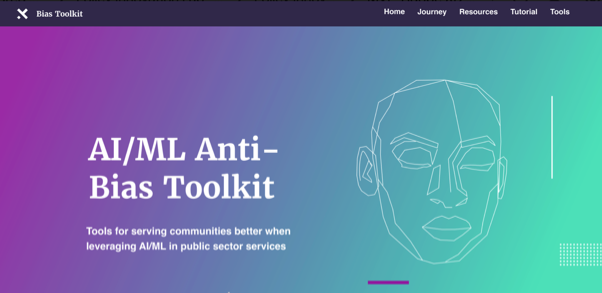REAL CHALLENGES, REAL SOLUTIONS
User-centered research. Human-centered design.
The Policy Innovation Lab (PIL) is an intensive, applied policy course at Heinz College that prepares students to become public interest technologists who are creative, ethical, inclusive, and responsive. This is accomplished by teaching graduate students how to design and build public interest technology services with human-centered design, and by following an agile methodology. Working directly with a client from a government office or public service nonprofit, students aim to develop and deliver a Minimum Viable Product (MVP) with high-impact results.
Select PIL students may be invited to continue their work during a fellowship the following summer.
The Public Interest Technology University Network Challenge Fund, a fiscally sponsored project of New Venture Fund has generously supported the development of open access course materials and the PIL Playbook, as well as the creation of Public Interest Tech (PIL) Fellowships at Heinz College.
Policy Innovation Lab Course Materials
Course materials for the Policy Innovation Lab are currently available through CUNY’s Public Interest Tech OER Commons site, the Public Interest Tech platform pitcases.org operated by Georgetown, Howard and Stanford universities, and Canvas Commons. We intend for these free resources to make it easier for universities to adopt and enhance coursework in public interest technology.
The materials include 7 weekly course modules, 12 assignment instructions and rubrics, a sample syllabus, instructor notes, and other course resources. They also include sprint planning and research plan templates, agile methodology readings and videos, and prototyping tools.
These course materials were also referenced in the development of the ‘Teaching Public Service in the Digital Age’ syllabus.
Policy Innovation Lab Playbook
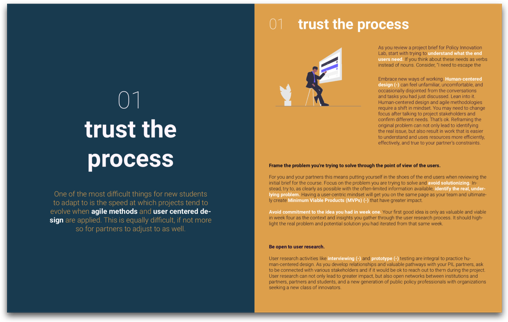
The PIL Playbook was designed and improved with student input, and includes a series of custom “plays” designed to help new students ramp up quickly to a Public Interest Technology mindset. The PIL Playbook has been an important resource for ongoing PIL courses at Heinz College, and has helped provide new students with a model for how to operate most effectively within the structure of the course and apply the relevant methodologies in their work.
Public Interest Technology Fellowship
Some PIL students further developed PIT projects through funding provided by the New Venture Fund. The fellowships have supported these talented students during both the summer months as full-time fellows, as well as part-time academic year fellows.
RECENT Course Highlights
The RIF Impact Framework: Language, Legibility, and Design for Government Capacity
Project: In response to the growing invisibility of workforce disruptions across the U.S. federal government, a team of Heinz College graduate students developed the RIF Impact Framework. This cybernetic tool helps public institutions document and interpret reductions in force (RIFs) through a structured data schema and reflexive, ethics-driven practice. By mapping lost job functions, program impacts, and geographic relevance alongside narrative context, the framework offers a practical yet thoughtful approach to tracking diminished government capacity.
Designed for adaptability and transparency, the framework goes beyond data collection to encourage second-order observation—prompting institutions to reflect on their roles within larger systems. Rooted in public interest technology, labor theory, and systems thinking, the RIF Impact Framework supports democratic oversight, institutional memory, and long-term planning in an era of complex governance challenges.
Project Team: Jaimie An, David Fuentes, Amy Kang, and Liv Schaefer
The students were named runners-up for the 2025 #NewMacy Cybernetics Prize, awarded by the Laboratory for Cybernetics, in recognition of their work.
Finding the Needle in the Haystack: GovScan
Project: How can we take state plans for programs that are federally funded and state run (for example: Medicaid and child care subsidies) and make them digestible, easily searchable and actually useful to understand how 50 different states are implementing programs?
Project Team: Davis Craig, Aakash Dolas, Tyler Faris, and Eashwari Samant
Combing through countless PDF reports for hours in search of a piece of relevant information is no one’s idea of an interesting day at work. Tedious, overwhelming, soul-crushing, maybe. Engaging? Not so much.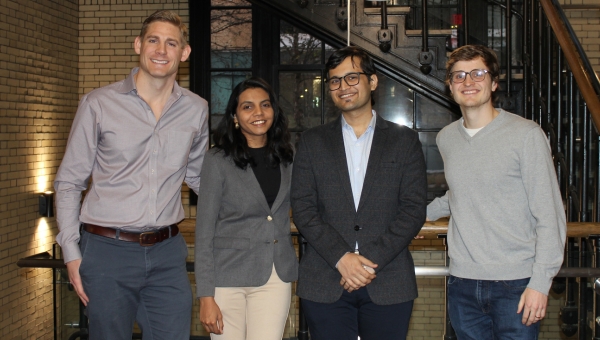
Dedicated public servants – and lots of other people – do it anyway, often, in service to some larger goal: to make the case for a new policy, to advocate for funding, or to explain a position. This team of students came up with a generative AI application that helps researchers find the information they seek in a matter of seconds, not hours.
Their tool, GovScan, provides government workers the ability to locate the proverbial needle in a haystack. Read the full story.
Students pictured above, (L-R): Tyler Faris, Eashwari Samant, Aakash Dolas, and Davis Craig.
Labor Trafficking: How Might We Create Safer Employment Opportunities for Immigrants/Asylum-Seekers?
Project: Technical interventions to help immigrants and asylum seekers avoid human trafficking
Project Team: Abdulaziz Abdulakhadov, Apoorva Shetty, Riddhima Singh, Tasneem Sultana, Jhanvi Udani
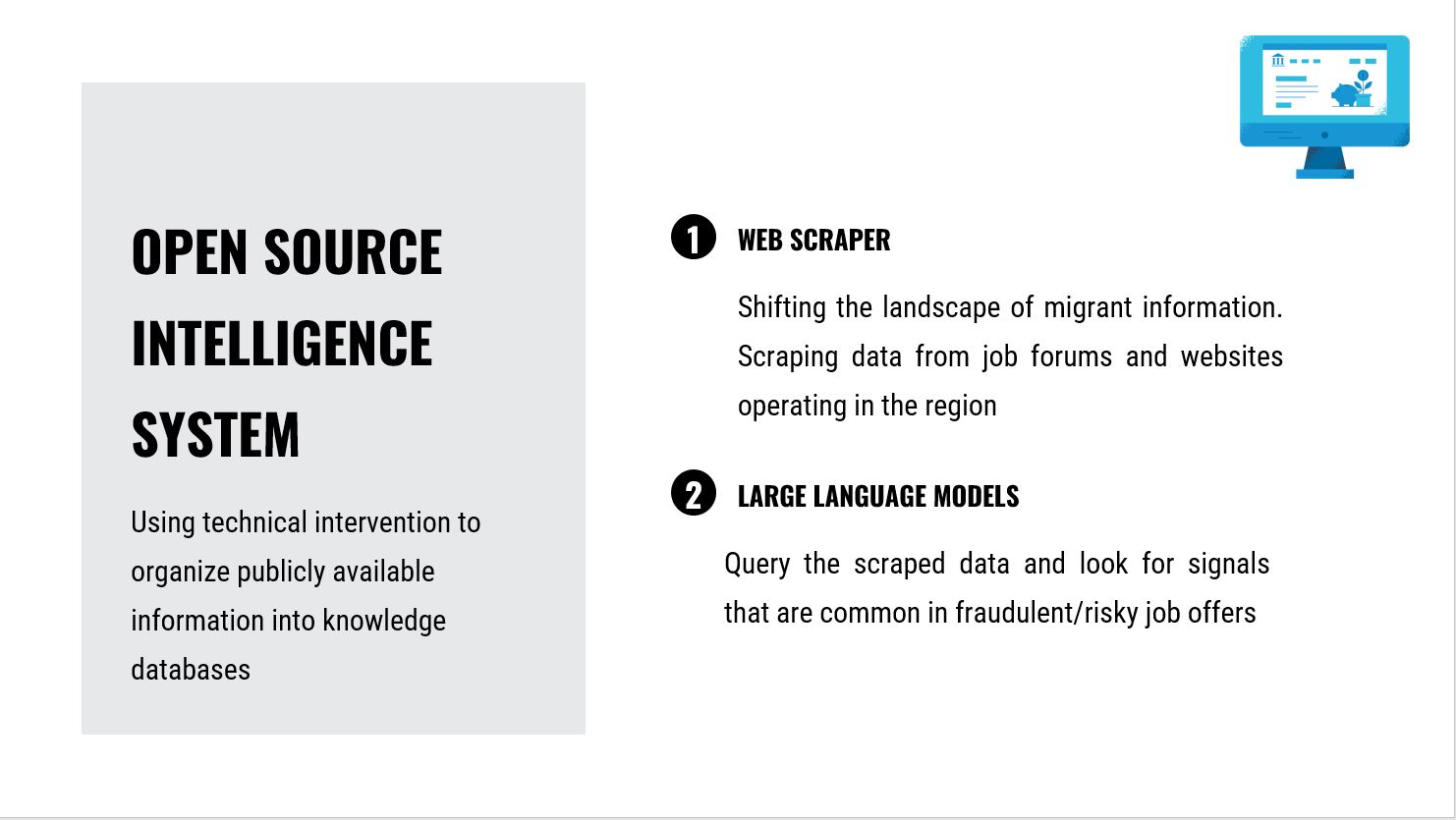
Criminals who deal in human trafficking prey on vulnerable people. Because they may not speak the language of their new country fluently and are often fleeing violence and poverty, immigrants seeking asylum are especially susceptible to exploitation. Human traffickers can lure such unsuspecting asylum-seekers through fake job postings hosted on popular employment websites. 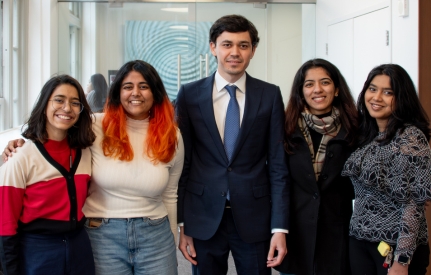
This student team worked with a researcher at Johns Hopkins University to develop a machine learning (ML) model that identifies signals indicating the risk of human trafficking through job descriptions.
They created a working prototype that accomplished two key tasks. First, it scraped online hiring websites to create a database of job postings. Second, the team applied a large language model (LLM) to analyze the content, flag potential scam offerings, and store details (names, entities, locations) about such listings.
This tool has the potential to help law enforcement agencies and non-governmental organizations (NGOs) that are attempting to stop human trafficking. The prototype could also be used to develop a web extension that helps non-native job seekers directly by analyzing the contents of the page and then indicating whether a given job appears to be a safe and legitimate opportunity.
Project image is from the final project created by student team.
Students pictured above, (L-R): Riddhima Singh, Apoorva Shetty, Abdulaziz Abdulakhadov, Jhanvi Udani, Tasneem Sultana.
San Francisco Public Utilities Commission
Project: Development of 'Impact Green,' an open source green bonds investment platform
PIT Fellows: Chizo Nwagwu, Sanika Saharabuddhe, Sarah Sherwood, Sharleen Devjani
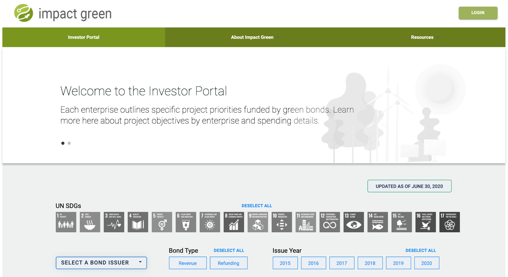
This was the first attempt at taking a project from the PIL course through the fellowship to a full capstone. The results shown in the Github repository linked below represents a culmination of those efforts.
Image is from the final capstone prototype deployed by the capstone team: Yueshan Lin, Yiran Pan, Chizobam Nwagwu, Tristan Pang, Yiting Hui, and Xuanming Cao.
Heinz College
Project: Development of 'Public Interest Technology Pipeline,' a reference guide for incoming students interested in PIT job opportunities
PIT Fellows: Lara Hasse
Heinz College/PPIA/NASPAA Public Service Weekend
Project: Our 2020 and 2021 Summer PIL Fellows provided mentorship to Public Service Weekend participants during our Policy Innovation Lab Team & Competition, where teams of students engaged in moonshot thinking to come up with creative ideas around the topic of policing and police data initiatives, and improving diversity in PIT.
This event is geared towards promising undergraduate students with a goal to “increase the participation and inclusion of traditionally underrepresented groups at the highest level of public sector leadership.”
Accelerator Model for the Policy Innovation Lab
Project: Carnegie Mellon University’s Heinz College is piloting an Accelerator Model for their Policy Innovation Lab. The vision is to encourage graduate level students to explore how to improve government through the launch of new products and ventures. This document provides an overview of the Accelerator and Partnering resources. It’s a free and open-source resource for the greater Public Interest Technology (PIT) University Network.
 Haleema Ahmad | She/Her | Linkedin: @haleemaahmad
Haleema Ahmad | She/Her | Linkedin: @haleemaahmad Yu-Jan Chang | She/Her | Linkedin: @yu-jan-chang
Yu-Jan Chang | She/Her | Linkedin: @yu-jan-chang  Priya Gupta | She/Her | Linkedin: @priyaharbolagupta
Priya Gupta | She/Her | Linkedin: @priyaharbolagupta Alex Jackson | She/Her | Github: @krystalrain
Alex Jackson | She/Her | Github: @krystalrain Alisar Mustafa | She/Her |
Alisar Mustafa | She/Her |  Campbell North
Campbell North Chizobam Nwagwu | Github @cnwagwu
Chizobam Nwagwu | Github @cnwagwu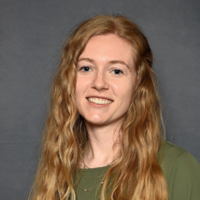 Sarah Sherwood | She/Her| Linkedin: @sarahsherwood19
Sarah Sherwood | She/Her| Linkedin: @sarahsherwood19